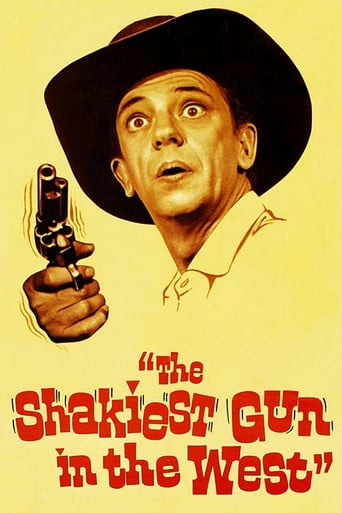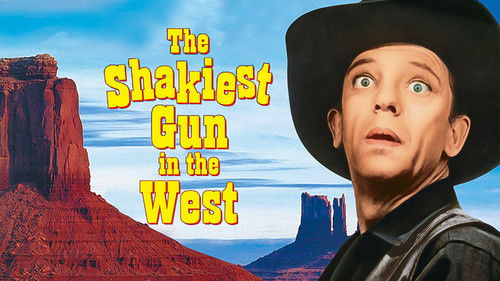AaronCapenBanner
Don Knotts stars as recent dental school graduate Jesse W. Heywood, who goes west from Philadelphia to make his name and fortune, but instead gets mixed up with stagecoach robber Penelope 'Bad Penny' Cushings(played by Barbara Rhoades), who is captured by authorities but offered a pardon if she will help them stop gun smugglers, which requires her to assume a new identity and husband - enter Jessie, who is all-too thrilled by her "romantic" interest in him, and helps him build a reputation as a gunfighter by doing his shooting for him... another silly comedy with Don Knotts doing his best with inferior material. Some occasional funny bits, and Rhoades is appealing, but film goes nowhere and leads to unfunny ending.
MARIO GAUCI
The second Don Knotts star vehicle that I've watched is perhaps more readily enjoyable than the first - THE GHOST AND MR. CHICKEN (1966) – but the fact that it was an unnecessary remake of the classic Bob Hope comedy THE PALEFACE (1948) hurts the overall effort. In fact, Knotts takes the role of a dentist out West who comes up (at least, initially) against an attractive sharp-shooting female robber (Barbara Rhoades) - played in the original by Jane Russell; when the latter is pardoned by the U.S. government and enrolled as their agent in hot pursuit of Indian gun-runners (one of whom is played by Jackie "Uncle Fester" Coogan), she is forced to hastily take the understandably awed Knotts for a husband as a cover (following the killing of her original intended).The amusing opening sequences depict Knotts' misadventures in dentistry – highlighted by his energetic encounter with a generously-built female patient who beats him up repeatedly within an inch of his life - but he is soon on his way westward because his hometown is already overrun with dentists. His wagon train is attacked by marauding Indians before long and, consequently, he earns himself a reputation as a fast gun (even though, in reality, it was Rhoades who mowed down ten Indians). After their marriage, Knotts is naturally more of a hindrance than a help to Rhoades in fulfilling her mission - even going so far as to bring about her abduction by the two villainous gun-runners to a nearby Indian camp when he follows her to a midnight rendezvous in a chapel.However, he proves his real mettle to his wife when, dressed up as a squaw(!), he infiltrates the Redskins' camp at night and frees Rhoades - but not before stirring up trouble (of the romantic jealousy type) between two Indians who, incongruously enough, had found Knotts' sinewy figure attractive in their eyes! At the end, yet another Indian wants to exert his lawful rights on the squaw-attired Knotts but he has to contend with the now-gushing Rhoades and her gunmanship. A harmless, moderately entertaining Western comedy, therefore, but nowhere near the shining examples of the genre (which, incidentally, include THE PALEFACE itself).
BeerBaron
It's easy to overlook the societal importance of "Shakiest". Most academics consider it a vapid re-make of a "superior" Bob Hope film. However my consensus is that Hope's movie simply Overemphasized the comedic aspects of the story and downplayed the sociological importance and mythical underpinnings of it. I don't fault Hope since his comedic talents are such that only his fully grasping of the genre and paradigm in its epistomological sense would allow him the proper frame/reference to "dim" his comedic talents enough to let the nuances of the story's deeper meanings emerge. Not so with Don Knotts. His performance is neo-subtle in the sense that he draws attention to the pre-Scorsesian templates of story entwined with yet seperated from, meaning, by overexaggerating Hope's performance to a Vonnegutian level. Example; his performance as Painless Jesse in the film's opening sequences underscore the relationship of Man the Creator with Man the Destroyer and Man the Dentist. In Barb Rhoades we see an equal but lesser voice representing tenets of Post-modern imperialism as well as Proto-Schwarzeneggerian grandiosity. Yet, it is Knotts, initially passive who redeems himself in the end, triumphing over Rhoades and all she symbolizes as well as echoing the pan-universal theme of the hero transformed by "plumbing" his own depths. This is shown particularily in the mine scene, where we read "mine" as "Subconscious Id". Simply put, not sense "The Incredible Mr. Limpett" has Knotts blended Transformational Mythology with Wellesian Cinematography and Jerrylewisian slapstick. BRAVO!
rev_ex
I saw this movie,by accident.It reminded me a lot,of the book,The Puppy Who Lost his Way.It was filled with well written classic comedy,that I can only see Mr. Knotts performing. The boy,being society.I think it was followed in spirit by other films further down the line.Funny Farm,and it's own references to a miss-adventures in an element that is not ones own. I give it four and a half stars on a scale of five.Two thumbs up,fine holiday fun.....




